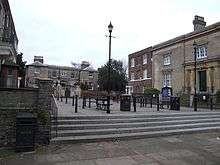Wisbech
| Wisbech | |
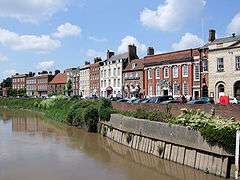 North Brink |
|
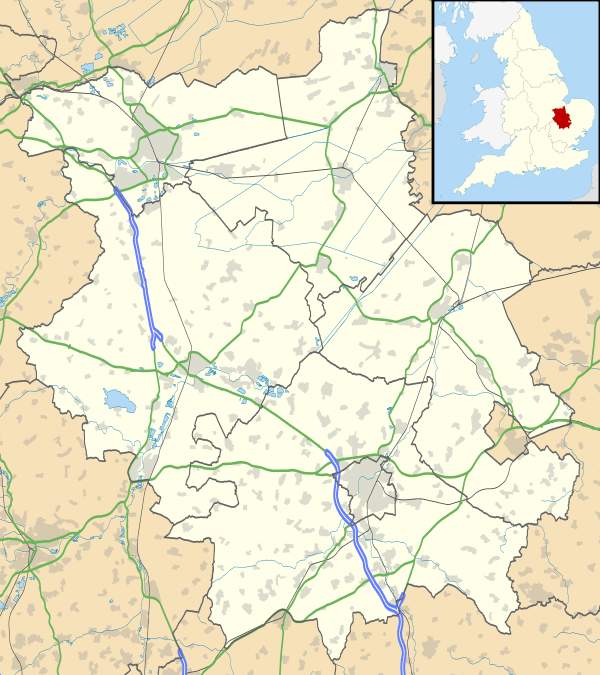 Wisbech |
|
| Population | 31,573 (2011) |
|---|---|
| OS grid reference | TF4609 |
| Civil parish | Wisbech |
| District | Fenland |
| Shire county | Cambridgeshire |
| Region | East |
| Country | England |
| Sovereign state | United Kingdom |
| Post town | WISBECH |
| Postcode district | PE13 PE14 |
| Dialling code | 01945 |
| Police | Cambridgeshire |
| Fire | Cambridgeshire |
| Ambulance | East of England |
| EU Parliament | East of England |
| UK Parliament | North East Cambridgeshire |
|
|
Coordinates: 52°39′50″N 0°09′36″E / 52.664°N 0.160°E
Wisbech (/ˈwɪzbiːtʃ/) is a market town, inland port and civil parish in the Fens of Cambridgeshire, England. It has a population of 31,573. The tidal River Nene runs through the centre of the town and is spanned by two bridges. The name is believed to mean on the back of the (River) Ouse, Ouse being a common Celtic word relating to "water" and the name of a river that once flowed through the town. Since 2011 Wisbech has become the second largest town in Cambridgeshire (after St Neots;[1] Before the Local Government Act 1972 came into force in 1974 Wisbech was a municipal borough.
History
During the Iron Age, the area where Wisbech would develop lay in the west of the Brythonic Iceni tribe's territory. Like the rest of Cambridgeshire, Wisbech was part of the kingdom of East Anglia after the Anglo-Saxon invasion.
The first authentic reference to Wisbech occurs c. 1000, when Oswy and Leoflede, on the admission of their son Aelfwin as a monk, gave the vill to the monastery of Ely. (J. Bentham, Hist. Ely, 87). In 1086 Wisbech was held by the abbot, there may have been some 65 to 70 families, or about 300 to 350 persons, in Wisbech manor. It must be remembered, however, that Wisbech, which is the only one of the Marshland vills of the Isle to be mentioned in the Domesday book, probably comprised the whole area from Tydd Gote down to the far end of Upwell at Welney. [2]
Wisbech Castle was built by William I to fortify the town, and during the reign of Elizabeth, James I and Charles I became a state ecclesiastical prison, incarcerating Catholics, many of whom died there of insanitary conditions.[3] Among those held there were John Feckenham, the last Abbot of Westminster, and later two of the key participants in the Gunpowder Plot, Robert Catesby and Francis Tresham. The castle was rebuilt in the mid-17th century, and again in 1816 by Joseph Medworth, who also developed The Crescent, familiar as the setting in numerous costume dramas.
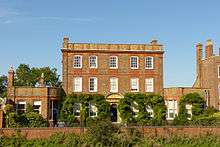
Peckover House, with its fine walled garden, was built for the Quaker banking family in 1722 and now owned by the National Trust. Formerly known as Bank House, the Peckover Bank later became part of Barclays Bank.
In the 17th century, the local inhabitants became known as the "Fen Tigers" because of their resistance to the draining of the fens, but the project turned Wisbech into a wealthy port handling agricultural produce. At this time Wisbech was on the estuary of the River Great Ouse, but silting caused the coastline to move north, and the River Nene was diverted to serve the town. The Wisbech Canal joining the River Nene at Wisbech was subsequently filled in and became the dual carriageway leading into the town from the east (now crossing the bypass).
On 27 June 1970, the heaviest point rainfall was recorded in Wisbech, when 2 inches (50.8 mm) fell in just 12 minutes during the Rose Fair.
On 21 September 1979, two Harrier jump jets on a training exercise collided over Wisbech; one landed in a field and the other in a residential area. Two houses and a bungalow were demolished on Ramnoth Road, causing the death of Bob Bowers, his two-year-old son Jonathan Bowers and former town mayor Bill Trumpess.[4]
The five-mile (8-kilometre), £6 million A47 Wisbech/West Walton bypass opened in spring 1982.
The port now houses a large number of berths for yachts adjacent to the Boathouse development.
On 19 January 2012, BBC Look East reported that there were growing tensions in the town where one-third of the population are East European migrants.[5]
The town's market days are Thursday and Saturday.
Railways
Prior to the 1960s Beeching Axe, Wisbech had three railway branch lines: the 1847/1848-1968 GER March to Watlington (junction), Norfolk (on the Ely to King's Lynn main line) via Wisbech East (Victoria Road); the 1866-1959 M&GN Peterborough to Sutton Bridge via Wisbech North (on Harecroft Road); and the 1883/1884-1966 GER Wisbech and Upwell Tramway. There were also harbour quay lines either side of the River Nene – M&GN Harbour West branch and GER Harbour East branch.
The Wisbech and March Bramleyline heritage railway would like to restore and re-open the remaining March to Wisbech line as a tourist line similar to the Mid-Norfolk Railway at Dereham. The Wisbech branch is Network Rail property and is still classed as a fully functioning goods line, although the last goods service was in Summer 2000, so the Bramleyline Heritage Railway would lease the track from NR on a 99-year lease. When the line has been fully re-opened, following HM Rail Inspectorate approval, rail services would run between March Elm Road (a new station next to Elm Road crossing, March) and Wisbech East (a new station on Weasenham Lane, Wisbech). It is hoped that a new station will be built at Coldham on the site of the old station's Down (Wisbech bound) platform, with another at Waldersea to allow visitor access to where the group hope to have a depot.
There is an active campaign to reopen the March to Wisbech line as part of the national rail network, with direct services to Cambridge or possibly Peterborough. A report published in 2009 by ATOC (the Association of Train Operators) indicated this as viable, and is now supported by Wisbech Town Council, and subject to reports commissioned by the County Council for publication in 2013.
Culture
The Angles Theatre is a thriving professional theatre, run almost entirely by volunteers and backed by many leading names including Derek Jacobi, Jo Brand and Cameron Mackintosh.
The amateur dramatic group the Wisbech Players has been performing for over 50 years. They currently perform twice a year in spring and autumn at the Angles Theatre.
Amateur dramatic group the Wisbech Amateur Operatic and Dramatic Society (WAODS) have been providing musicals to the town since 1905 and a yearly pantomime since 1975. The society's home is at the local Thomas Clarkson Community College, where rehearsals and performances take place.
Every summer a "Rose Fair" is held in aid of St Peter's Church. The church is decorated with floral displays sponsored by local organisations and businesses. A parade of floats forms up in Queens Road and circuits the town. Strawberry and cream teas are served and stalls raise funds for local charities. Coaches bring visitors from a wide area. Details are available from the local tourist office.
The Luxe cinema in Alexandra Rd screens films in a former WI hall.
Wisbech is twinned with Arles in France.
Local youth organisations include the Army Cadet Force, Air Training Corps, Sea Cadets, Girls Venture Corps Air Cadets, Fire cadets and St John Ambulance cadets. There are numerous Scouting groups for boys and girls.
Education
Wisbech's two secondary schools (11-18) are the state-funded Thomas Clarkson Academy (formerly the Queen's School, which itself was the amalgamation of the Queen's Girls' and Queen's Boys' schools), and the independent Wisbech Grammar School, which was founded in 1379, making it one of the oldest schools in the United Kingdom.
Primary schools in Wisbech include; Clarkson Infants, St Peters Juniors, The Orchards, Peckover, Nene Infants, Ramnoth Junior School, Leverington Primary School and Elm Road Primary School. There is also a school for children with special learning needs, Meadowgate School. There is also a further education centre, the College of West Anglia formerly the Isle of Ely College, in the town.
Sport
The local football team is Wisbech Town Football Club, nicknamed The Fenmen. Other sports clubs include Wisbech Rugby Union Football Club, Wisbech Hockey Club (who are currently looking to recruit players to strengthen both the Men's and Ladies 1st team squads), Wisbech Tennis Club, Wisbech Cricket Club (who have an annual fixture with the M.C.C. - Marylebone Cricket Club), Wisbech Squash Club, Wisbech Swimming Club and a number of martial arts clubs.
The "Nine Mile River Swim" between Wisbech and Sutton Bridge in the River Nene was won four times in the 1930s by Ernie (Bunny) Bunning. When the swim was moved to the swimming pool as a 220-yard race David Bunning, his son, won the cup four times in the 1960s.
Notable buildings
- Peckover House (1722; owned by the National Trust)
- Thomas Clarkson Memorial (1881)
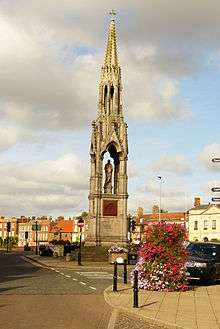
- Richard Young MP Memorial (1871) sited in Wisbech Park.
- Parish Church of St Peter and Paul. There are some pictures and a description of the church at the Cambridgeshire Churches website.[6]
- Our Lady & Saint Charles Borromeo Church
- St Mary's Parish church, also on the Cambridgeshire Churches website.[7]
- Octavia Hill Birthplace Museum where she was born before the family's move to London.
- Wisbech & Fenland Museum; extensive collections of local records and other items. Notable artifacts include: Napoleon's Sèvres breakfast service, said to have been captured at the Battle of Waterloo; Thomas Clarkson's chest, containing examples of 18th century African textiles, seeds and leatherwork which he used to illustrate his case for direct trade with Africa; and the original manuscript of Charles Dickens' Great Expectations. The manuscript can be viewed on the first Saturday of each month.
- Elgood's Brewery; The brewery was founded in 1795, and bought soon after by the Elgood family. It is a traditional brewery, but produces less than some modern micro-breweries, with output at around 90-100 barrels per week. The beers produced include: "Black Dog Mild", "Golden Newt", "Cambridge Bitter", "Greyhound Strong Bitter", "Old Smoothie Mild", "Old Smoothie Bitter", "Brookes Ale", "Reinbeer" and "Jingle Ale". Recently the brewery has won the Champion Beer of Britain award for its Cambridge Bitter. The brewery is also known for its gardens, which are open to the public.
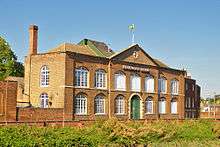 Elgoods Brewery on North Brink in Wisbech.
Elgoods Brewery on North Brink in Wisbech.
_p68b_-_(Wisbech)_Corn_Market.jpg)
- Rose and Crown, Wisbech; The Hotel has towered over the fens for nearly 600 years. The Rose and Crown Hotel is the best example of the progress of the Town with examples of Tudor, Elizabethan, Georgian, Victorian and Edwardian Architecture. The Tidnams owned the Hotel until 1932 and imported Port, Sherries and wine up the River Nene. These were matured in the cellars under the Hotel and also in cellars under Bridge Street. These enormous underground chambers were built more than 200 years ago in what had been the cut supplying water to the moat of the medieval castle. The Tidnams distributed their Ports, Sherries and wines from Wisbech all over Britain and their whiskey brand, Tidnams Tipple, was remembered in the name of the Hotel’s main town bar, Tidnams Tipple Inn, now named ‘Back in Time’.[8]
Notable people
In order of birth:
- Constable William Wolsey and painter Robert Pygot were burned at the stake for Christian heresy on 16 October 1555.[9][10]
- Joseph Medworth, (born in Wisbech, 1752–1827) was a builder who developed 'The Crescent' in Wisbech and redeveloped "Thurloe's' Mansion" into the current villa on the 'Castle' site.
- William Godwin, (born in Wisbech, 3 March 1756 – 7 April 1836) was an English political writer and novelist, considered an important precursor of utilitarian and of liberal anarchist thinking. He first married Mary Wollstonecroft. A daughter of theirs, Mary Wollstonecroft Godwin, became Mary Shelley, famed author of Frankenstein.
- Thomas Clarkson, anti-slavery campaigner, was born in Wisbech in 1760 and educated at Wisbech Grammar School. The Clarkson Memorial was built to commemorate his life's efforts to end slavery in the British Empire on 25 March 1833.
- John Clarkson, (1764–1828) younger brother of Thomas, was another key figure in the British abolitionist movement. As governor of Sierra Leone he organised voluntary migration of former slaves freed by the British under a deal to reward their loyalty during the American War of Independence.
- William Skrimshire, (born in Wisbech, 1766–1829) was a surgeon and botanist.
- Elizabeth Dawbarn (died 1839) was a religious pamphleteer addressing children and adults.
- Richard Young (1809–1871) was an MP, shipowner, Mayor of Wisbech (1858–62), and a sheriff of the city of London in 1871.
- William Digby, (born in Wisbech, 1 May 1849 – 29 September 1904) was an English writer, journalist and liberal politician, and first secretary of the National Liberal Club.
- Rev. William Hazlitt, who was minister at the Presbyterian meeting house here in 1764–66, became an influential Unitarian minister. He was father of the essayist William Hazlitt and the portrait painter John Hazlitt. While resident at Wisbech he married Grace Loftus.
- Sisters Miranda and Octavia Hill, born at Wisbech, founded the Kyrle Society, a progenitor of the National Trust, of which Octavia became co-founder.
- Alexander Peckover (banker) (16 August 1830 – 21 October 1919) Baron Peckover of Wisbech, was Lord Lieutenant of Cambridgeshire in 1893–1906.
- Rev. W. Awdry (15 June 1911 – 21 March 1997), creator of Thomas the Tank Engine, was Vicar of Emneth in 1953–65. Toby the Tram Engine, one of Awdry's characters, was based on the small steam trams that ran farm produce on the Strawberry Line between Wisbech and Upwell.
- Bernard Martin (1916–2005) was a local councillor and town mayor 1980–81.
- Jesse Pye (1919–1984), professional footballer, scored two goals in the 1949 FA Cup Final, and played for England, before becoming a player-manager for Wisbech Town F.C. in 1960–66.
- John Gordon (born 1925), adolescent fiction writer and author of The Giant Under The Snow, grew up in Wisbech. The town and the surrounding fens inspired many of his novels, including The House on the Brink (Peckover House) and Fen Runners.
- Russell Arthur Missin (born 1922 at Gorefield, near Wisbech) was organist and Master of Choristers at Newcastle Cathedral.
- Jill Freud (born 1927), actress (and wife of Clement Freud, MP for Isle of Ely 1973-87) founded Jill Freud and Company while working with Angles Theatre in 1980.
- Anton Rodgers (1933–2007), actor, was born in Wisbech.
- Sir Harry Kroto (1939–2016) was the 1996 Nobel Laureate in chemistry, for the discovery of fullerenes.
- Mick Walker (born 30 November 1942, Wretton, Norfolk – 8 March 2012) was a Wisbech motor cyclist and author.
- Malcolm Douglas Moss, (born 1943, Lancashire) politician, was a Wisbech Town councillor and later MP for North East Cambridgeshire from 1987 until retirement at the 2010 general election.
- Tony Martin (born c. 1944), gained notoriety while living in an isolated Norfolk farmhouse outside Wisbech, for shooting two men and killing one of them. Both travellers, they were burgling his home one night. Martin was convicted of murder, but gained fame as a symbol of rough justice.
- Mike Stevens (born 1957) is a musical director and record producer.
- Lance Hart (born c. 1959), perpetrator of the 2016 Spalding shooting, was a former resident of Wisbech.
- Joe Perry (born 13 August 1974 in Wisbech) – is a snooker player.
- Jody Cundy (born 14 October 1978 in Wisbech) is a Paralympian.
- Will Millard (born 29 June 1983) is a writer and explorer, and presenter of BBC2's Hunters of the South Seas.[11][12]
Film and television
_p68a_-_(Wisbech)_The_Brinks.jpg)
Wisbech is noted for its unspoilt Georgian architecture, particularly along North Brink and The Crescent. It has been used in BBC One's 1999 adaptation of Charles Dickens' David Copperfield and ITV1's Micawber, starring David Jason. A "Wisbech Rock Festival" appears in the film Still Crazy. The 2008 feature film Dean Spanley starring Peter O'Toole was largely filmed in Wisbech. The effect of immigration on the town was featured in the BBC documentary "The Day the Immigrants Left", presented by Evan Davis. The programme looked at jobs in the town reported to have been "taken over by migrants". In the programme, several local unemployed persons were given the chance to try such jobs.[13][14][15]
Wisbech in the news
There are two free newspapers distributed within the town, the Wisbech Standard (owned by Archant) and the Fenland Citizen.
According to a study looking into immigration patterns, Wisbech was once identified as the seventh "most English" town in Britain by Sky News However, on 16 February 2008 a report in the Daily Express titled "Death Of A Country Idyll" wrote about how the influx of Eastern European immigrants may have caused the increase of crime and other illegal activities. Then on 20 February 2008 The Fenland Citizen contained an article opposing the Daily Express article.[16]
In January 2012 the Daily Mail ran a story following the murder of Alisa Dmitrijeva, a Latvian teenager and resident of Wisbech, whose body was found on the Queen's Sandringham estate. The article alleged that the quintessentially English town had been taken over by a sinister Eastern European drug and crimes ring nicknamed the "Baltic Mafia" who were terrifying local residents. The article reported that there had been five murders within the Eastern European community from Wisbech within the last two years.[17]
On 28 August 2012 there was a serious incident at the Wisbech District Hospital when police were called because of people reportedly on the roof of Wisbech District Hospital. Two local officers of the Cambridgeshire Constabulary, Wisbech Policing Team answered the call. On arrival they found one of the hospital's doctors had been assaulted by the group. As the two officers split up to search the hospital, one of the suspects a woman armed with an axe returned to the hospital making threats to kill, one woman police officer tackled the woman, disarming her and restraining her on the floor. Her colleague joined her and assisted in detaining the woman until help arrived.
The woman detained was arrested and in November 2012 pleaded guilty to numerous offences at Cambridge Crown Court, including burglary, assault, public order offences and racially aggravated harassment. Both police received formal commendations for their actions.[18][19][20][21]
Another officer of Cambridgeshire Constabulary, Wisbech Policing Team also made the news when on Friday 12 November 2013, when he was struck off his bike on Churchill Road by a shoplifting suspect he was chasing. Despite suffering a broken ankle he remounted his bike and chased the suspect for 20 minutes before cornering him in Prospect Place. Despite the man attempting to escape by climbing a fence PCSO McCormack kept hold of the man detaining him, even as he violently resisted, until help arrived. The suspect was arrested.[22]
Climate
Like the rest of the United Kingdom, it experiences an oceanic climate but Cambridgeshire is one of the driest counties in the British Isles along with Essex. February is the driest month, whilst October is the wettest. In temperature terms, both January and December are the coldest months, whilst August is the warmest.
| Climate data for Wisbech | |||||||||||||
|---|---|---|---|---|---|---|---|---|---|---|---|---|---|
| Month | Jan | Feb | Mar | Apr | May | Jun | Jul | Aug | Sep | Oct | Nov | Dec | Year |
| Average high °C (°F) | 7 (45) |
8 (46) |
11 (52) |
13 (55) |
16 (61) |
19 (66) |
21 (70) |
22 (72) |
19 (66) |
15 (59) |
10 (50) |
7 (45) |
14 (57.3) |
| Daily mean °C (°F) | 4.5 (40.1) |
5 (41) |
7 (45) |
9 (48) |
12 (54) |
14.5 (58.1) |
16.5 (61.7) |
17 (63) |
14.5 (58.1) |
11 (52) |
7 (45) |
4.5 (40.1) |
10.21 (50.51) |
| Average low °C (°F) | 2 (36) |
2 (36) |
3 (37) |
5 (41) |
8 (46) |
10 (50) |
12 (54) |
12 (54) |
10 (50) |
7 (45) |
4 (39) |
2 (36) |
6.4 (43.7) |
| Average precipitation cm (inches) | 4.5 (1.77) |
3 (1.2) |
3.3 (1.3) |
4 (1.6) |
4.6 (1.81) |
4.4 (1.73) |
4.8 (1.89) |
5.2 (2.05) |
5.3 (2.09) |
5.6 (2.2) |
5 (2) |
4.4 (1.73) |
54.1 (21.37) |
| Average precipitation days | 18 | 15 | 15 | 14 | 13 | 12 | 12 | 12 | 13 | 16 | 17 | 17 | 174 |
| Source: World Weather Online[23] | |||||||||||||
Twin town
 Arles, France (1964)
Arles, France (1964)
See also
Further reading
- Dorothy Thurman, with illustrations by Derek Abel (1998). Wisbech. The Wisbech Society and Preservation Trust Ltd. ISBN 0-9519220-5-X.
- Arthur Oldham. Pubs and Taverns of Wisbech (out of print).
- Ellen Gibson Wilson. The Clarksons of Wisbech and the abolition of the slave trade. The Wisbech Society and Preservation Trust Ltd. ISBN 0-9519220-0-9.
- Peter Clayton. Octavia Hill 1838-1912 Born in Wisbech. The Wisbech Society and Preservation Trust Ltd. ISBN 0-9519220-1-7.
- Roger Powell. Richard Young of Wisbech 1809-1871. The Wisbech Society and Preservation Trust Ltd. ISBN 0-9519220-3-3.
- Madeline G H McReynolds. The Peckovers of Wisbech. The Wisbech Society and Preservation Trust Ltd. ISBN 0-9519220-2-5.
- John Gordon. The House on the Brink. Childrens Book Club. ISBN 0060220287.
- John Gordon (2009). Fen Runners. Orion Childrens. ISBN 1-84255-684-3.
- A History of the County of Cambridge and the Isle of Ely: Volume 4: City of Ely N. and S. Witchford and Wisbech Hundreds. 2002.
References
- ↑ According to [www.huntingdonshire.gov.uk] and the St Neots town council website.
- ↑ [Wisbech: Manors', A History of the County of Cambridge and the Isle of Ely: Volume 4: City of Ely; Ely, N. and S. Witchford and Wisbech Hundreds (2002), pp. 243-245.]
- ↑ http://www.wisbech-society.co.uk/castle.html The Wisbech Society & Preservation Trust, The Castle
- ↑ BBC Archive
- ↑ BBC: Migrants singled out by attackers in Wisbech
- ↑ This church's page at the Cambridgeshire Churches website
- ↑ This church's page at the Cambridgeshire Churches website
- ↑
- ↑ Foxe, John (1838). Seymour, Michael Hobart, ed. The Acts and Monuments of the Church; containing the history and sufferings of the martyrs. London: Scott, Webster and Geary. pp. 820–821.
- ↑ Blakeman, Pamela (1990). The Book of Ely (Limited no. 589 ed.). Barracuda Books. p. 131. ISBN 0-86023-466-5.
- ↑ http://www.bbc.co.uk/news/blogs-ouch-32315803
- ↑ http://www.willmillard.com/
- ↑ http://www.bbc.co.uk/programmes/b00r3qyw
- ↑ http://news.bbc.co.uk/local/cambridgeshire/hi/people_and_places/newsid_8530000/8530168.stm
- ↑ https://www.youtube.com/watch?v=bbq_2dai4Hk
- ↑ Wisbech: blighted by crime? - Fenland Today
- ↑ Drugs, the teenager found murdered on the Queen's estate and how the Baltic Mafia is terrorising one of Britain's oldest market towns
- ↑ http://www.elystandard.co.uk/news/heroic_pcso_who_disarmed_axe_wielding_woman_at_wisbech_hospital_to_receive_bravery_award_tomorrow_1_3011868
- ↑ http://www.police.uk/cambridgeshire/Fenland_Wisbech/
- ↑ http://www.police.uk/cambridgeshire/Fenland_Wisbech/team/pcso-lisa-mann/
- ↑ http://www.police.uk/cambridgeshire/Fenland_Wisbech/team/
- ↑ http://www.cambstimes.co.uk/news/heroic_psco_chases_down_man_who_knocked_him_off_his_bike_despite_suffering_a_broken_ankle_1_2979185
- ↑ "Wisbech, United Kingdom Weather Averages". World Weather Online. Retrieved November 2011. Check date values in:
|access-date=(help)
External links
| Wikimedia Commons has media related to Wisbech. |
| Wikisource has the text of the 1911 Encyclopædia Britannica article Wisbech. |
- Fenland & West Norfolk Aviation Preservation Society
- Wisbech Town Cricket Club
- The Angles Theatre
- 2001 Census
- River Nene through Wisbech, from source to mouth.
- Fenland Citizen Web site of local newspaper
- Fenland District Council District councils web site
- The Wisbech Society & Preservation Trust
- Thomas Clarkson Academy
- Wisbech Amateur Operatic & Dramatic Society (WAODS)
- Wisbech Players
- Octavia Hill Birthplace House
- Community website
